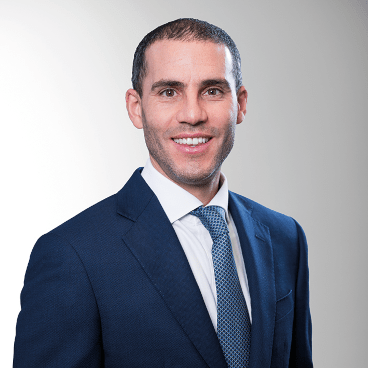Achieving Sustainability
Interview with Giles Money and Alex Bibani

Launched in 2003, the Allianz Global Sustainability fund was one of the first global sustainability funds, and AllianzGI is proud of this long track record and the firm’s pioneering stance in this area. Portfolio Managers Giles Money and Alex Bibani have been working together for over five years, and Giles has been running sustainable portfolios since 2005. Here, they join us to give a better understanding of the Global Sustainability strategy.
Q: First, why does sustainability matter for you? And how does that shape your investment philosophy?
Giles: As active equity investors, our mission is to invest for, and deliver to clients, market-leading returns by participating in the commercial success of well-governed companies. We believe the key to such success in the 21st century relies upon alignment with positive societal and environmental outcomes. And we are not the only ones who believe that: 84% of millennial investors prioritise investment with an ESG (environmental, social, and governance) focus. Moreover, as wealth gets progressively transferred to GenZ and millennials, this way of thinking will increasingly become the norm.
Alex: A consequence of this thinking implies, for us, taking a critical look at the investment universe. In order to access sustainable growth, certain sectors – so-called “stranded assets” – are best avoided. This includes unsustainable sectors related to, for example, thermal coal or combustion engines, but also sectors that risk becoming obsolete due to technological developments, such as travel agencies or print media, for instance. On the other hand, sectors that aim to shape the energy transition, such as electric vehicles (EVs), or spearhead innovative technologies, such as cloud computing, stand to benefit over the longer term.
Q: Could you tell us a little about what makes the Allianz Global Sustainability fund unique?
Giles: In terms of its uniqueness, I would focus on our investment process. We rely on stock picking as our primary driver of investment returns, and we seek to avoid taking on too much factor risk – a common challenge for sustainability funds. Furthermore, this process is based on a five-to-ten-year outlook, seeking to identify companies that are mispriced relative to their long-term potential.
Alex: Indeed, and to this end we focus on three factors that could contribute to mispricing. First, good quality growth companies are sometimes undervalued because people are looking at the next two to three years, rather than five-to-ten. Companies like this represent between 50 and 100% of the portfolio at any time. Second, the market can dislike certain companies for cyclical reasons; these companies make up between 0 and 25% of the portfolio and represent our value component. Third, some quality growing companies are currently undergoing significant change or restructuring; these companies also make up between 0 and 25% of the portfolio.1
Q: Building on this, what else distinguishes the fund from other offerings in the market?
Giles: Given this distinctive investment approach, we are less style-oriented than some of our peers, and, as mentioned, we seek to avoid factor risk. The fund is relatively concentrated – with about 40 to 60 stocks1 – and limits its investment universe through hard exclusions, then using a best-in-class approach that leverages a range of data providers to address potential discrepancies in ESG data. This allows for differentiated returns, driven by conviction equity holdings, and the fund shows good performance versus its peer group.
Alex: A further differentiator is the depth of expertise on our team, and the support they receive from our dedicated sustainability units whose responsibility extends across the entire business. In addition, we have very experienced teams on the ground in Asia, a key advantage given our global positioning. These teams, plus the investment process described above, make our fund highly differentiated in the market.
Q: You mentioned your exclusionary/best-in-class approach to stock picking. Could you elaborate a little?
Giles: Our process starts by excluding any companies deriving significant revenues from, for instance, thermal coal, alcohol, gambling, or weapons. Our dedicated team of global sustainability analysts then score the remaining equity universe according to sector-relevant ESG criteria. This approach thus enables us to invest in companies with industry-leading ESG management, as well as those that are committed to improving their ESG performance going forward. Our portfolio managers then combine this ESG analysis with the output of our fundamental research team, resulting in a balanced portfolio of companies with both superior financial and ESG characteristics.
Alex: This approach allows us to benefit from both concentration and diversification and gives us a deep understanding of our investments from both ESG and fundamental perspectives.
Furthermore, we actively engage with companies to help improve their ESG performance – not just those currently in the portfolio but also others in which we see potential and opportunity, but currently fall short of our stringent criteria.
We take our responsibility as an active manager very seriously, both in terms of stewarding our clients' assets and seeking to encourage the best ESG performance possible from companies we engage with.
Q: Finally, what are the key points you would want anyone considering investing in the Allianz Global Sustainability fund to consider?
Giles: First, I would point to two of the differentiating factors discussed above – our pioneering approach and long track record in this area, as well as our engaged stock picking process and the support it receives from specialist teams across the business. Alongside this, I would emphasize the role that our fund plays in facilitating the sustainable transition. By investing in companies that are pioneering sustainable technologies – and business models – and engaging with them to encourage the best performance, we believe we are paving the way for a more sustainable economy in the years to come.
1 This is for guidance only and not indicative of future allocation.






